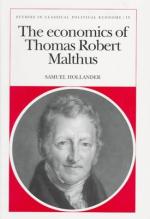|
This section contains 10,398 words (approx. 35 pages at 300 words per page) |

|
SOURCE: Walzer, Arthur E. “Logic and Rhetoric in Malthus's Essay on the Principle of Population, 1798.” Quarterly Journal of Speech 73, no. 1 (February 1987): 1-17.
In the following essay, Walzer analyzes Malthus's Essay in terms of its rhetorical strategies.
In 1798, Thomas Robert Malthus published anonymously An Essay on the Principle of Population, As It Affects the Future Improvement of Society, with Remarks on the Speculations of Mr. Godwin, M. Condorcet, and Other Writers.1 In his famous Essay, Malthus argues against the possibility of the utopian future predicted by such Enlightenment reformers as William Godwin and Antoine-Nicolas de Condorcet. To counter the reformers' philosophic optimism, Malthus advances his principle of population. According to Malthus, population tends to increase at a geometric rate by a factor of two every generation (or twenty-five years). Thus, in 1700, assuming a population of five million people in England and Wales, by 1725 population would be ten million; by...
|
This section contains 10,398 words (approx. 35 pages at 300 words per page) |

|


